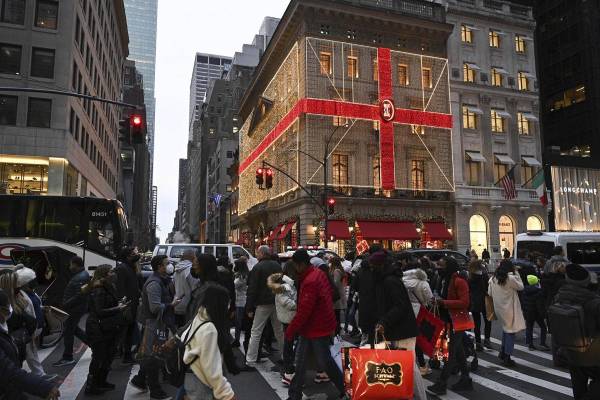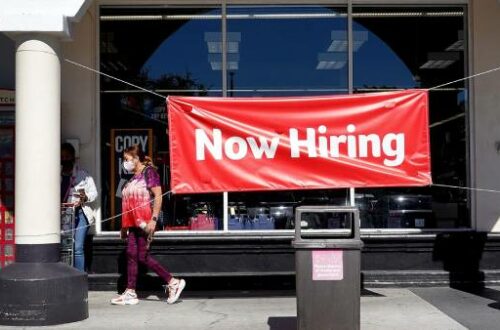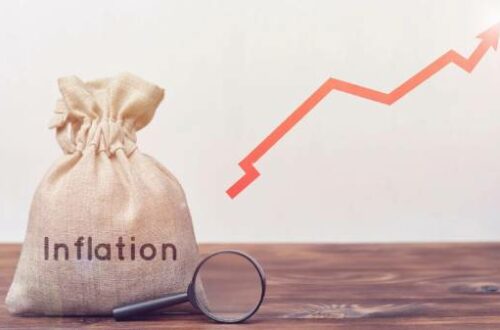
Cautioning sign for the economy: Consumers get irritable
- Retail deals declined 1.9% in December, much more awful than the estimate for a 0.1% drop.
- Frail internet based deals were liable for a large part of the slide alongside a fall in spending at bars and eateries.
- Import costs declined on the month, the primary diminishing since August.
Purchasers are getting grouchy with regards to expansion, Omicron and a large group of different difficulties. That is not a decent sign for the US economy.
Americans shopped less in December, causing the principal drop in retail deals since the mid year.
Deals dropped 1.9% contrasted and November, adapted to occasional swings, the Census Bureau revealed Friday.
Retail deals fell considerably more than anticipated in December as flooding costs whittled down spending, the Commerce Department announced Friday.
Buyers are getting irritable with regards to expansion, Omicron and a large group of different difficulties. That is not a decent sign for the US economy.
Americans shopped less in December, causing the primary drop in retail deals since the late spring.
Deals dropped 1.9% contrasted and November, adapted to occasional swings, the Census Bureau revealed Friday.
The decrease in deals concurred with the flood in Covid cases because of the exceptionally irresistible Omicron variation. In July, the last time deals dropped, it was on the rear of cases ascending because of the Delta variation.
Eateries and bars enrolled a 0.8% decrease in deals in December as individuals remained at home to ensure themselves against the infection, for instance.
The customer value record rose 0.5% for the month, bringing the year-more than year gain to 7%, the most noteworthy since June 1982. Discount cost additionally rose, climbing 9.7% in the year time frame for the greatest schedule year ascend since information was continued to return to 2010.
Web based spending endured the greatest shot as a portion of by and large spending, with nonstore retailers announcing a dive of 8.7% for the month. Furniture and home outfitting deals declined 5.5% and outdoor supplies, music and book shops saw a 4.3% drop.
The pullback in retail deals is “perplexing,” said Lydia Boussour, lead US financial specialist at Oxford Economics. However, she noticed that Christmas shopping season was longer than any time in recent memory, with stores asking clients to finish their present purchasing ahead of schedule to try not to send delays from the stuck inventory network.
All things considered, the feeble finish to the year doesn’t look good for buyer spending, which is the foundation of the US economy.
More vulnerable spending could burden financial development in the last quarter of the year and slow force going into the main quarter of 2022, Boussour said.
Eateries and bars, which posted a 41.3% yearly addition in 2021 to lead all classifications, saw a decay of 0.8% for the month. Service stations were a nearby second for the year, with a 41% flood in deals, however considered a 0.7% decline in December to be fuel costs moved lower. Fuel costs fell 0.5% to finish off a year when costs at the sump took off 49.6%.
Just two classes saw increments for the month: random store retailers, which rose 1.8% and building materials and planting focuses, which posted a 0.9% addition.
A different Labor Department report Friday showed import costs fell 0.2% for December, against assumptions for an increment of 0.2%, the primary negative number since August and due in great part to a 6.5% fall in import fuel costs.
Expansion and Covid variations burden customer feeling
However buyers aren’t feeling so hot right now. The beginning to 2022 has been unpleasant, in the midst of the Omicron flood and expansion that continues to drift higher.
Buyer feeling dropped in January, as per primer information from the University of Michigan, tumbling to 68.8, or the second least level in 10 years.
“While the Delta and Omicron variations surely added to this descending movement, the decay was likewise because of a raising expansion rate,” said Richard Curtin, boss financial specialist of the Surveys of Consumers.
Lower pay families had a more regrettable outlook on expansion just as the financial viewpoint, contrasted and higher pay families.
Central bank authorities lately have been focusing on the significance of taking off expansion, with numerous policymakers saying they hope to begin raising loan costs when March. The Biden organization has joined national bank pioneers in setting a large part of the fault at increasing costs on pandemic-explicit factors, for example, a tremendous interest for merchandise over administrations and store network issues.
The value flood, however, has come after remarkable degrees of money infusions to the economy from both financial and money related arrangement.
Mia is a literature author. Mia was not interested in becoming a writer when she was a child, a fact which she himself admits that separates her from fellow writers she has met. As a young adult, Mia did not know what she wanted to be. she remembered, however, how in high school, she had been a class clown, and that made her decide to become a books writer. Later on, she moves toward the writing news articles. In recent she writes her news on Stock Invests.
Disclaimer: The views, suggestions, and opinions expressed here are the sole responsibility of the experts. No STOCK INVESTS journalist was involved in the writing and production of this article.





